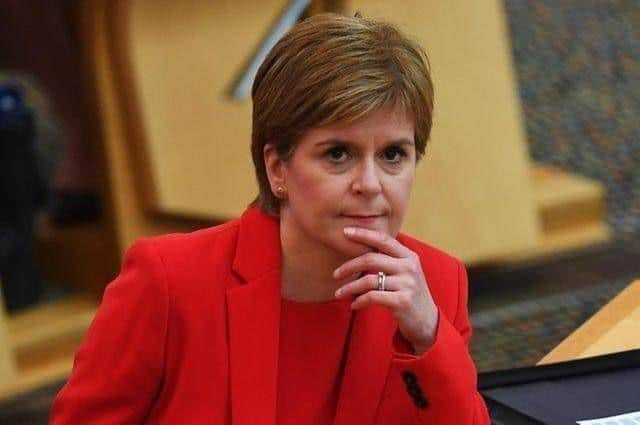SNP ministers delay 'hard choices' over budget until after party conference
Deputy First Minister John Swinney insisted the Scottish Government would not replicate the “reckless tax cuts” announced down south.
Chancellor Kwasi Kwarteng last week unveiled a series of measures, including scrapping the top rate of income tax for those earning £150,000 a year or more and cutting the basic rate to 19p in the pound.
Advertisement
Hide AdAdvertisement
Hide AdFirst Minister Nicola Sturgeon has already indicated she will not follow the tax cut for high earners in Scotland, where income tax rates and bands are devolved.


The Institute for Fiscal Studies (IFS) said the widening income tax gap north and south of the border could see high earners move away from Scotland.
Ms Sturgeon previously pledged the Scottish Government would lay out its own emergency budget review “within two weeks” of the UK Government’s announcement – a commitment that will now be broken.
Speaking in Holyrood, Mr Swinney, who is also acting as finance secretary, said he would convene an expert advisory group and respond to the Chancellor’s mini-budget at the end of October.
The SNP’s party conference takes place in Aberdeen over three days from October 8. The announcement of cuts or tough decisions in the days leading up to it could have cast a shadow over proceedings.
Earlier this month, Mr Swinney announced £500 million of spending cuts and warned these were “just the beginning of the hard choices” that will need to be made.
Financial markets have been in turmoil since Mr Kwarteng’s announcement on Friday, with the pound falling to a record low against the US dollar on Monday morning.
Responding to questions in Holyrood, Mr Swinney said: “We will not be replicating the Tories’ reckless tax cuts, but we’ll consider carefully the correct measures for Scotland.
Advertisement
Hide AdAdvertisement
Hide Ad“I intend to seek advice from an expert panel specifically convened to consider the implications of the mini-budget, and will also embark on discussions with business and trade union interests.”
He said he would present an emergency budget review to Parliament on the week commencing October 24.
The Deputy First Minister continued: “The damaging impact of the UK Government decisions on Friday demonstrate why Scotland needs the full range of financial powers to avoid living at the mercy of bad decisions taken in Westminster.”
Conservative MSP Douglas Lumsden said Mr Swinney appeared to have already ruled out tax cuts for workers in Scotland.
He said: “Some of the Scottish Government’s former economic advisers warned that Scotland cannot afford to fall further behind the rest of the UK in the tax gap.
“So why will you not ensure that tax cuts are passed on – but not to the rich, but to our doctors, nurses, teachers and police, who face being taxed more during the cost-of-living crisis than their colleagues in the rest of the UK?”
Mr Swinney said replicating the Conservative plan would mean tax cuts for those who were already “very, very wealthy”.
Saying he would consider the issue “carefully”, he added: “I don’t think any of us should underestimate the scale of disruption and damage that was done by the announcements on Friday.
Advertisement
Hide AdAdvertisement
Hide Ad“I have to take a careful and prudential approach in managing the public finances of Scotland, and that is what I’m going to do.”
Speaking afterwards, Mr Lumsden said: “It seems as though ‘Honest John’ doesn’t want to have to discuss tough economic choices in front of the party faithful. Despite committing to carrying out this emergency budget review, he’s now kicked it further down the line.
“John Swinney has serious questions to answer as to why a so-called emergency review will now not take place until over a month after the UK Government’s fiscal event took place.”
If the Scottish Government does not make changes to income tax, everyone earning more than £14,732 will pay more in Scotland compared to the rest of the UK.
High earners would pay an additional rate of 46 per cent on earnings of more than £150,000, while those in the rest of the UK would pay 40 per cent.
David Phillips, head of devolved and local government finance at the IFS, told The Scotsman there was "limited evidence so far on the responsiveness of the highest-earning Scots to differences in tax rates between Scotland and rUK [the rest of the UK]”.
He said: “So we haven't got any quantitative prediction of what would happen. However, I would expect a difference of 6 percentage points in the top marginal rate to have a more significant impact on taxpayer behaviour. One response could be to move from Scotland (or similarly not move to Scotland).
"Those high-income Scots with a home in both Scotland and England (e.g. that work partly in London) could rejig their time so they spend a bit more time in England and so can pay the lower UK Government tax rates.
"It’s also worth noting that people don't actually need to move – they could incorporate and so take their income in the form of dividends, on which UK rates will continue to apply.”
Comments
Want to join the conversation? Please or to comment on this article.
